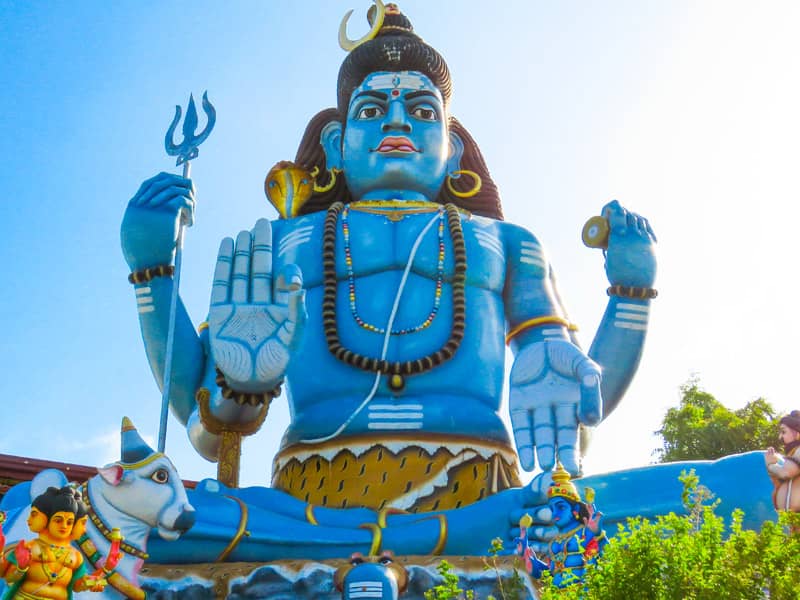To an outsider, it would have looked like we were praying to those pictures. If we were in a temple, we would have been praying to statues. To some old-school Western minds, that's straight-up idol worship-pretty obvious paganism and polytheism. And when I went to school, that's what my textbooks said-Hindus were polytheists. Teachers and textbooks felt the need to categorize, but the categories offered as options did not suit the religion I knew from my Friday afternoon worship.
As far as I could tell, I was more monotheist than polytheist. But the problem wasn't in figuring out which one I was-the problem was my discomfort at the need to put Hinduism, or any religion, in one box or another. Every Friday, I prayed in many ways, and directed my prayers through many routes-one divine face or another. Every Friday, I listened to fables intended to teach me something about how to act and what to respect. I saw no conflict between the fables, the images, and the idea of an all-encompassing divine presence.
Attendance at that Friday afternoon ritual helped to form one of my basic philosophies of being: everything in this world is a version of something else, and everything in this world is part of the same thing. This philosophy is as practical as it is spiritual, and it follows me into both professional and personal life. Over the years, it has made me something of a diplomat, a mediator. I can feel sympathy for virtually any side of an argument, as long as it is constructed with an internal logic. Sometimes, this willingness to accept many sides of an issue is an advantage. In a world that favors yes/no answers, however, it can also be a detriment, making me appear indecisive. In any case, it is a philosophy deeply rooted in the idea that very few things can be answered with a yes or no, and that generally, things that ostensibly contradict each other can actually be simultaneously true.
It is a philosophy that belongs to neither monotheism nor polytheism, that is unaware of those categories. It is a philosophy that made me stammer when my peers asked me what kind of religion Hinduism was or how many gods I worshiped. Nor did I see the use of an answer.
Hinduism is not unique in falling outside of the polytheistic/monotheistic binary model that most people and textbooks use. I have Buddhist friends who are irritated by the idea of even being classified as a religion-they consider Buddhism a philosophy, not a religion. But Hinduism is unique, at least in the scope of my own knowledge about religion, in the way it presents its "monotheistic" and "polytheistic" facets. One enfolds the other. A prayer directed to Ganesh often asks for welcome-at other times, it requests blessings on studies. To process a world in which everything is one, a Hindu separates out parts of God for different purposes.
We see this in Hinduism's myths. Unlike virtually any other mainstream religion in the world, Hinduism remains attached to an active mythology that perhaps shares more with ancient Greek and Norse myths than anything else. Why are we telling stories about Shiva, his consort Parvati, and their two sons, Ganesh and Murugan? What about the hosts of minor demons, gods, and goddesses? A Hindu in northern India might worship a household god of whom a Sri Lankan Hindu knows nothing. But in Hinduism as I understand it, it does not matter. Those gods are really two manifestations of the same thing, and the plane upon which those gods, like the Greek gods, enact human-like drama and make human-like mistakes, is a different plane than from the one on which we worship. One is a cultural legacy, and the other is a spiritual one. However, they cannot be easily separated. Those planes intersect-in the language of math, they skew. One Beliefnet member offered another view on the message boards: "Hinduism is not algebra. Hinduism is quantum physics, the byte representing both 1 and 0 at the same time."
This multiplicity of truth is a pillar of the Hinduism I know. To categorize is not just impossible, it's irrelevant. Just as, throughout life, we discover parts of ourselves we had not known, we discover more faces of God. Just as a mother is also a daughter, God will always exist both in one face and beyond that face. A Hindu praying for something specific simply underlines the request by directing it to the facet of the deity whose business that is. My God has different faces; he does not explain them. He simply has the ability to be both One and Many.

